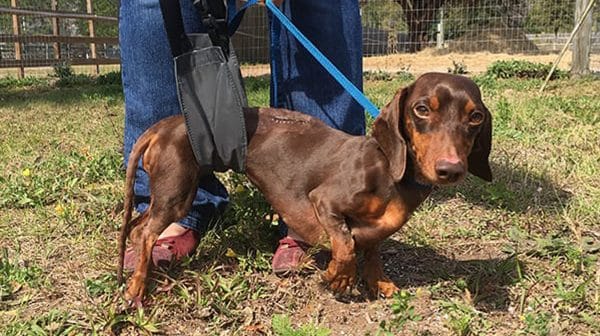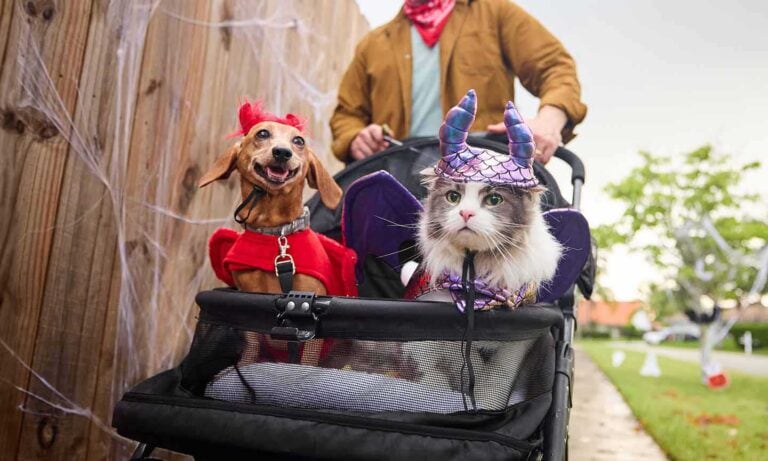When they brought Franklin to the emergency animal hospital in Jacksonville, FL, his owners complained that he was dragging his hind legs. Diagnosed with intervertebral disc disease, the Dachshund with the big, soulful eyes was confined to a kennel and treated with steroids and analgesics. But despite aggressive medical therapy for 24 hours, the Doxie got worse.
Intervertebral disc disease is common in small dogs; it affects 25% of Dachshunds. Due to constant jumping—on and off beds, up to couches, or just bouncing for joy—the discs between the vertebrae in the spine experience wear and tear and become irritated. Franklin’s owners were faced with the choice of a $3,000-$4,000 surgery that would require intensive post-op physical therapy, or to keep the dog on steroids and see if he’d still be able to walk at the end of the month.
“With his diagnosis, he had about a 50% chance that he wouldn’t ever walk again,” says Dr. Britany Timberlake, DVM, who was on her part-time shift at the animal ER when Franklin was admitted. “[We had] to say, ‘We’re going to do this really radical surgery and your dog may not really walk again. You have to sit and do physical therapy for four-to-six weeks, and hope that he gets better.’ That’s a hard commitment for some people to make.”
But Franklin had already made his emergency medical team fall in love with him, and Dr. Timberlake was among his admirers. “My gosh, he was just so cute, and he was so kind,” she gushes. “He just had the kindest eyes. He was so young.”

The vet was so taken with the dog that when his family asked if there was anything else they could do, she offered to shoulder the cost of surgery and the post-op rehabilitation herself if they signed Franklin over to her.
“They agreed to it. They were ecstatic. They thought, ‘well, it’s better than putting him down,’” Dr. Timberlake says. “They were happy someone else was willing to take on that care for physical therapy, because it’s a large commitment—financially, physically and emotionally.”
Franklin’s kind Samaritan was able to able to get him into a surgical specialty group who performed surgery the very next day. And while the procedure went well, the long road to rehabilitation still lay ahead for the pint-sized pup.
The road to recovery was not easy. The first step was getting Franklin to stand by putting him on his feet and making sure he wouldn’t fall over. This alone took 4-5 weeks, along with manually bicycling his legs to keep his muscles from atrophying, or wasting away. But there were other hurdles, as well. After the surgery, Franklin did not have use of his bladder or his bowels, so Dr. Timberlake would have to manually express both several times a day. And there was separation anxiety to deal with—after all, Franklin had lost his original family. Dr. Timberlake became his world. “I had to be with him the whole time. He really latched onto me,” she says. “When dogs that are in dire situations are shown overwhelming compassion when [they] need it most, they really attach to those people.”
Dr. Timberlake, who co-owns Southeast Veterinary Hospital with her husband, already had two big dogs at home. Both animals, described as “seasoned car riders,” accompanied her on the 45-minute car trip to her clinic every day. Franklin was another story. The Dachshund did not take to the car travel and did not enjoy the stress of being around strangers at the veterinary office. “He was becoming more stressed, and I was concerned about that,” Dr. Timberlake says.
Moved by Franklin’s day-by-day struggle, the staff at Southeast Veterinary Hospital began to take videos of his treatment and set them to montage music like “Chariots of Fire” and “Rocky Balboa.” Franklin dived into the world of social media and made a splash. “The Facebook traffic blew me away,” Dr. Timberlake says. “There were like 12,000 views on one of them. It was just crazy how it got around!”
Donations began to trickle into Southeast’s AVMF Veterinary Care Charitable Fund for Franklin’s treatment. But it wasn’t just the local community that began to notice. Daniela Englmann, a client of Dr. Timberlake’s who had recently lost two dogs to old age, overheard the staff discussing Franklin and asked to see him. “She just fell in love with him,” Dr. Timberlake says. “I will say I was a little bit concerned because she has two smaller children, and Dachshunds aren’t known for loving kids.”
At this point, Dr. Timberlake began to leave him in the clinic overnight so that he wouldn’t have to travel by car every day. But Franklin disliked being alone even more than his unhappy road trips. Englmann couldn’t have appeared at a better time, and like others before her, she couldn’t help but fall in love with the resilient Doxie. When she brought her sons to Franklin’s recovery pen, he not only perked up, but greeted the kids with two big kisses.
Once the physical therapy routine was established, Englmann wanted to try it out for herself. “Her commitment to his physical therapy was really instrumental in getting him to walk again, and he’s thriving now,” Dr. Timberlake says. Consequently, the family began to make weekly visits to check in on Franklin, eventually bringing husband Michael McDermott and their other pooch, Marble, to meet the Dachshund. Slowly but surely, Franklin was bonding with his forever family—something Southeast Veterinary Hospital officially announced on May 15, 2017 in a heartfelt blog post, complete with a family portrait where everyone is all smiles.

“He’s not scared and timid anymore. He’s so confident. Literally and figuratively, he found his voice,” Dr. Timberlake says. “I never heard that dog bark the whole time that I had had him. The last time that we were all together, he was barking and running around and just a totally different dog. It was amazing. It was really great to see that, and to see how happy they all were together. It really made it worthwhile.”
In order to spot intervertebral disc disease early, Dr. Timberlake recommends to be mindful of pained noises upon being lifted or touched, walking with a hunched back, and stiff or limp hind limbs. As for Franklin, he definitely found his happy ending.
“It makes me happy. People that we don’t even know are supporting him and supporting us, and it makes me feel like the world isn’t really that bad,” Dr. Timberlake says. “We can all come together over a Dachshund.”
If you’d like to help other dogs like Franklin, you can donate to Southeast’s AVMF Veterinary Care Charitable Fund (VCCF) or encourage your local vet to start a VCCF of their own.
Share:









